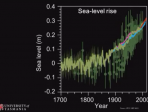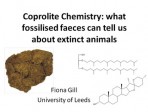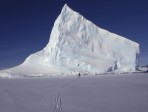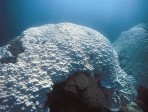 01:30:00
01:30:00
Behaving badly
Are environment, or genetics, more to blame when a human being turns to a life of crime? What does it mean to be criminally insane? And how effectively can a criminal tendency be treated with drugs? What different lights can literature and science sh....
More details | Watch now 01:07:00
01:07:00
Climate change and extinction
Today countless protected areas for biodiversity are maintained at huge public and private expense. The question we must consider is whether our protection strategies actually protect when the real threats are related to the current climate change. M....
More details | Watch now 01:05:00
01:05:00
Climate change on the living Earth
Observations from around the Earth suggest that even the gloomiest predictions of climate change from the 2007 IPCC report may underestimate the seriousness of the changes due this century. In this lecture, Professor James Lovelock discusses the cons....
More details | Watch now 00:47:00
00:47:00
Climate change: space and our own planet.
Dr Maggie Aderin develops instruments that monitor climate change. Find out about these and other missions that are making science count in the battle against climate change. With practical experiments to show how climate change works Maggie shows ho....
More details | Watch now 01:05:00
01:05:00
Continental loss: the quest to determine Antarctica’s contribution to sea-level change
For over 50 years scientists have been working to understand Antarctica’s contribution to sea level. For much of this time there has even been disagreement about if this massive ice sheet is growing or shrinking. In 2012, advances in data analysis....
More details | Watch now 00:29:00
00:29:00
Coprolite Chemistry – what fossilised faeces can tell us about extinct animals
Faeces contains a complex mixture of chemical compounds, including substances from the diet and digestive processes. By better understanding the biology of extinct animals we can gain insights into how they interacted with their environment and poten....
More details | Watch now 01:12:00
01:12:00
Deciphering disease: cells and disruption of their communication
The human body may seem to be no more than a bundle of tissues and organs, yet the cells these are made from are capable of interacting, communicating and performing complex tasks. Our cells' capacity to interact in this way enables humans to adapt t....
More details | Watch now 01:20:00
01:20:00
From sled dogs to rockets. Up the poles.
As part of the celebrations for International Polar Year, Paul Rose takes us on an insightful science journey to the Antarctic and the Arctic. What really are the challenges facing scientists as they work in the remotest field sites on earth?
More details | Watch now 01:08:00
01:08:00
Housing for a low carbon energy future.
Almost half of the UK 's energy is used in buildings to provide a safe, healthy, comfortable, productive and fun environment. Most future low carbon scenarios assume significant reductions in carbon emissions associated with the built environment ove....
More details | Watch now 01:01:00
01:01:00
How embryos build organs to last a lifetime
All the organs of our body originate from small founder populations of cells which multiply into complex structures. ÊAdult stem cells are used to maintain organs throughout adult life and to repair or regenerate them after damage.Ê Focusing on the....
More details | Watch now 01:01:00
01:01:00
Is the Great Barrier Reef on Death Row?
Professor J.E.N Veron, the former Chief Scientist of the Australian Institute of Marine Science and widely regarded as the world's leading authority on coral reef ecosystems, presents the effects that climate change is having on coral reefs.
More details | Watch now 01:02:00
01:02:00
NeuroNavigation: how the brain represents the space we live in and finds our way around
Learning about new environments or locating ourselves in familiar environments are some of the most fundamental tasks that the brain performs. Information is not stored in response to biological needs such as hunger or thirst but on the basis of cogn....
More details | Watch now
